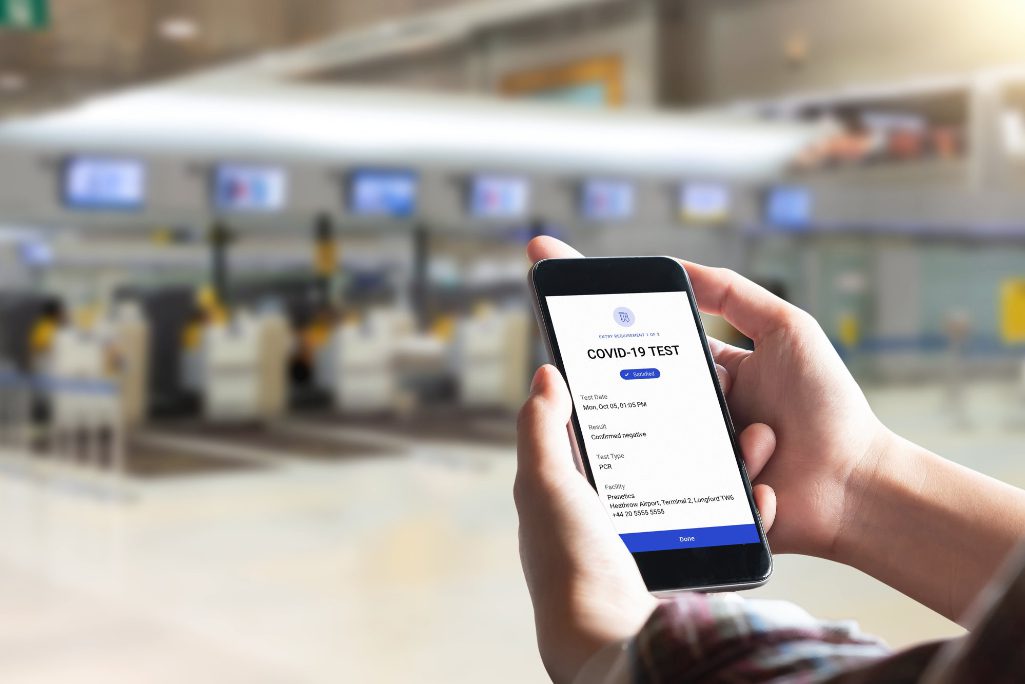Skift Take
It's interesting to hear that travelers are open to digital health passports, once the right safeguards are in place to protect their data. But it still remains unclear who will pay for and manage the vaccination certifications.
One of today’s most hotly debated topics is the “digital health passport,” or a vaccination certification that stores a person’s health information related to Covid-19, such as vaccination records and test results. A new survey adds another data point on how well the traveling public might accept such passports.
According to a study commissioned by travel technology giant Amadeus, nine out of ten travelers would be comfortable using digital health passports to help restart travel.
Censuswide did the late February survey of 9,055 travelers in France, Spain, Germany, India, United Arab Emirates, Russia, Singapore, UK, and the U.S. on Amadeus’s behalf. The online survey was of people who said they have traveled abroad in the last 18 months (with a minimum of 1,000 respondents per market).
A cautionary side note was that 93 percent of travelers surveyed also said they had “some concerns” about how their health data might be stored. Travelers told survey takers that their main concerns were about their personal information falling into the wrong hands and a lack of control over who could access their data.
Despite the concerns, 62 percent of travelers surveys said they would be more likely to use an app to store their health data if a travel company partnered with a trusted healthcare company to create the app.
Amadeus has something of a vested interest in the debate. The Madrid-based company is embedding digital health passports into the software it provides airports and travel suppliers to store and vet traveler identification documents.
Plans for vaccine passports are still in flux. Aruba is one of the rare countries to launch one. Several European Union governments are hoping by mid-June to roll out a plan where Europeans who are vaccinated receive a certificate with a barcode that officials at airports could scan to verify vaccinations.
CommonPass is one standard that proposes a model where travelers take a Covid-19 test at a certified lab and upload the results to their mobile phone. Vaccination records could be similarly stored.
A fight has commenced over who should pay for digital health passports. While border control officers mainly inspect visas, airlines have long had to confirm that passengers have the correct visas ahead of departure. Given the revenue crisis of the past year, many airlines say they don’t have the resources to police digital health passports.
In the U.S., the Biden Administration said it had no plans to mandate or fund digital health passports. In Europe, one inter-governmental proposal would set aside money only to build a central portal but not to do the other work to make testing and vaccination certifications widely used.
For context on digital health passports, see this comprehensive overview of digital passports in Skift’s video interview last month with Paul Meyer, CEO of the Commons Project Foundation. To learn more, read Skift’s Explainer: Digital Health Passports Explained in 5 Questions.
Subscribers to Skift Research can check out the latest report: Pandemic Travel: 2020 U.S. Traveler Deep Dive.
The Daily Newsletter
Our daily coverage of the global travel industry. Written by editors and analysts from across Skift’s brands.
Have a confidential tip for Skift? Get in touch
Tags: amadeus, coronavirus, coronavirus recovery, surveys, vaccine passports
Photo credit: Shown here is one digital health pass. A survey of more than 9,000 travelers in multiple countries found that 91 percent would be comfortable using digital health passports to help restart travel, says Amadeus-commissioned research. CommonPass

